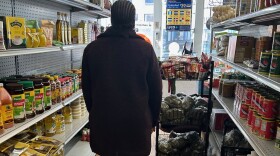President-elect Donald Trump's immigration policies could have widespread economic impacts, especially on industries that rely heavily on immigrant workers. In Maine, some agricultural producers say their reliance on guest worker programs should insulate them from any potential crackdown. But other employers say they are concerned about their workers becoming targets for deportation.
At Flood Brothers Farm in Clinton, hundreds of dairy cows are quietly munching on feed. But one inquisitive brown Jersey cow seems more interested in licking farmer Jenni Tilton-Flood's hand.
"Hi princess. What are you doing?" Tilton-Flood said as the cow nuzzled her hand "You're a content, snotty nose girl."
The cow is one of over 4,000 at the farm, which producers around 18,000 gallons of milk every day.
Tilton-Flood said nearly 50 employees keep this family dairy operation running year round and about two-thirds of them are immigrants.
She's concerned that some of them could get swept up in Trump's long-promised mass deportation operation.
"I think that it would be wrong and irresponsible as an American and a business owner and an employer to not be concerned about threats of deportation," Tilton-Flood said.
Tilton-Flood said she has all the documentation she needs to legally hire her workers, but said she doesn't know the details of each employee's immigration pathway.
Across the U.S., the agricultural sector is heavily dependent on immigrant labor, said Rebecca Shi with the American Business Immigration Coalition, a bipartisan advocacy group.
In addition to the human cost of mass deportations, Shi said the removal of large numbers of immigrant workers would affect consumer prices.
"Prices of goods and services will go up, like we saw during the pandemic when we did not have enough workers," she said.
A recent analysis from the American Immigration Council said mass deportation could cut over $1 trillion from the U.S. economy annually, and exacerbate the country's labor shortage.
That could be especially true in Maine, said state chamber of commerce president Patrick Woodcock.
"For some specific companies, the immigrant community has been a really strong contributor in recent years to fulfill some of the strains on the labor shortage that we have in the state," he said.
Woodcock added that some of the industries most reliant on immigrant workers include agriculture, seafood processing, and manufacturing.
In addition to looming threats of deportation, Woodcock said he'll be watching how the new administration handles Temporary Protected Status, which applies to certain immigrants fleeing countries deemed too dangerous to return to.
"If that is revoked for existing immigrants in the United States, that could have some severe implications," he said.
Still, Woodcock said it's too early to say exactly what Trump's immigration policies will look like, or how they will affect Maine.
One sector of the state's agricultural economy that has become increasingly reliant on foreign workers is the blueberry industry.
Dave Bell, with blueberry processor Cherryfield Foods, said that's in part because harvesters have to compete with other seasonal businesses to hire a large group of workers for the short summer harvest.
"Often, the good folks that want a job for the summer already have jobs when we hit our peak needs, such as harvesting the crop and getting it processed," Bell said.
But he said he hopes his company, and others like it, will be insulated from potential immigration policy changes because they rely on a seasonal work visa program. Known as H-2A, Bell said it's proved politically durable under multiple administrations.
"When we look back over the last eight years," he said, "the H-2A guest worker program for agriculture has been extremely stable."
Meanwhile, at the dairy farm in Clinton, farmer Jenni Tilton-Flood said she's bracing for an abrupt change in immigration policies, and fears that many people aren't considering the potential impact on farms and families.
"I don't think that people who easily overlook all this understand the chasm and pain that might actually occur," she said.





